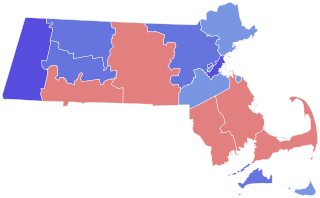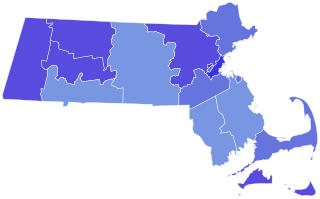
The 1984 United States Senate elections were held on November 6, with the 33 seats of Class 2 contested in regular elections. They coincided with the landslide re-election of President Ronald Reagan in the presidential election. In spite of the lopsided presidential race, Reagan's Republican Party suffered a net loss of two Senate seats to the Democrats, although it retained control of the Senate with a reduced 53–47 majority. Democrats defeated incumbents in Illinois and Iowa, and won an open seat in Tennessee, while Republicans defeated an incumbent in Kentucky.
Raymond Shamie was an American politician and businessman from Massachusetts. Shamie served as the chair of the Massachusetts Republican Party and was twice the Republican nominee for the United States Senate.
In U.S. politics, a primary challenge is when an incumbent holding elective office is challenged by a member of their own political party in a primary election. Such events, known informally as "being primaried," are noteworthy and not frequent in the United States, as traditionally political parties support incumbents, both for party unity and to minimize the possibility of losing the seat to an opposing party. In addition, officeholders are frequently seen as de facto leaders of their party, eligible to establish policy and administer affairs as they see fit. A primary challenge thus interferes with this "spoil of office," and is largely discouraged. Though typically used to describe challenges to elected officials, the term is also applied to officeholders such as appointed U.S. senators.

The 1986 Massachusetts gubernatorial election was held on November 4, 1986. Michael Dukakis was elected Governor of Massachusetts for a third term. He defeated Republican George Kariotis by a 69–31% margin. This would be the last time a Democrat was elected governor until 2006.

The 2008 United States Senate election in Massachusetts took place on November 4, 2008. Incumbent Democratic U.S. Senator John Kerry, who remained in the Senate after losing the presidency to incumbent President George W. Bush in the 2004 presidential election, won re-election to a fifth term in office. Four years into his term, Kerry resigned upon becoming United States Secretary of State in the Barack Obama administration.

The United States Senate election of 1978 in Massachusetts was held on November 7, 1978, with the incumbent Republican Senator Edward Brooke being defeated by Democratic Congressman Paul Tsongas.

Nicola Dickson "Niki" Tsongas is an American politician who served as a U.S. Representative from Massachusetts from 2007 to 2019. She held the seat formerly held by her husband, the late Paul Tsongas, for the district numbered as Massachusetts's 5th congressional district from 2007 to 2013 and as Massachusetts's 3rd congressional district from 2013 to 2019. She is a member of the Democratic Party. In August 2017 Tsongas announced that she would not seek another term in the November 2018 election.
The Massachusetts general election, 2008 were held on November 4, 2008 throughout Massachusetts. Among the elections which took place were those for the office of President of the United States, John Kerry's seat in the Senate, all ten seats in the Massachusetts delegation to the House of Representatives, all eight seats in the Massachusetts Governor's Council, and all of the seats of the Massachusetts Senate and Massachusetts House of Representatives. There were also three ballot questions: to eliminate the commonwealth's income tax; to decriminalize possession of a small amount of marijuana; and to prohibit greyhound racing. Numerous local elections also took place throughout the state.
The Commonwealth of Massachusetts is often categorized politically as progressive and liberal. All of the state’s U.S. representatives and senators are Democrats. Democrats also form the large majority of the state’s legislature, though the state has a history of electing Republican governors. As with most states, the two main political parties are the Democratic Party and the Republican Party.

The 1978 Massachusetts gubernatorial election was held on November 7, 1978. Former Massachusetts Port Authority executive director Edward J. King was elected to a four-year term, from January 4, 1979, until January 6, 1983. King won the Democratic nomination by defeating incumbent Governor of Massachusetts Michael Dukakis in the Democratic primary.
A Massachusetts general election was held on November 5, 2002 in the Commonwealth of Massachusetts.
A Massachusetts general election was held on November 4, 1986 in the Commonwealth of Massachusetts.
A Massachusetts general election was held on November 2, 1982 in the Commonwealth of Massachusetts.

The 2014 United States Senate election in Massachusetts was held on November 4, 2014, to elect a member of the United States Senate to represent the Commonwealth of Massachusetts, concurrently with the election of the Governor of Massachusetts, other elections to the United States Senate in other states and elections to the United States House of Representatives and various state and local elections.

The 2013 United States elections were held on Tuesday, November 5, 2013. This off-year election cycle featured several special elections to the United States Congress; two gubernatorial races; state legislative elections in a few states; and numerous citizen initiatives, mayoral races, and a variety of other local offices on the ballot.
A Massachusetts general election was held on November 7, 1978 in the Commonwealth of Massachusetts.
The 1974 Massachusetts general election was held on November 5, 1974, throughout Massachusetts. Democratic and Republican candidates were selected in party primaries held September 10, 1974.

The 2013 United States Senate special election in Massachusetts was held on June 25, 2013, in order to fill the Massachusetts Class 2 United States Senate seat for the remainder of the term ending January 3, 2015.

The 2020 United States Senate election in Massachusetts was held on November 3, 2020, to elect a member of the United States Senate to represent the Commonwealth of Massachusetts, concurrently with the 2020 U.S. presidential election, as well as elections to the United States Senate in other states, elections to the United States House of Representatives, and various state and local elections. On September 1, incumbent senator Ed Markey defeated U.S. Representative Joe Kennedy III in a competitive primary for the Democratic nomination, and Kevin O'Connor defeated Shiva Ayyadurai for the Republican nomination. Markey went on to win the general election with 66.2% of the vote, and was thus re-elected to a second full term in a landslide.

There were two special elections to the United States Senate in 2013; ordered by election date:

















